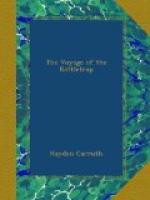“Yes, the nights are getting colder, that’s certain. I was just wondering if that cover will withstand snow as well as it does rain?”
“Why,” said Ollie, “do you think it’s going to snow?”
“Not to-night,” returned Jack. “But it may before we get out of the mountains. The snow comes pretty early up there sometimes. I think I’ll get inside and share the bed with the rancher after this, and you and Snoozer can curl up in the front end of the wagon-box. It would be a joke if we got snowed in somewhere, and had to live in the Rattletrap till spring.”
“I wouldn’t care if we could keep warm,” said Ollie. “I like living in it better than in any house I ever saw.”
“I’m afraid it would get a little monotonous along in March,” laughed Jack. “Though I think myself it’s a pretty good place to live. Stationary houses begin to seem tame. I hope the trip won’t spoil us all, and make vagabonds of us for the rest of our lives.”
We were reluctant to leave this camp the next morning, but knew that we must be moving on. It was but a few miles to the town of Buffalo Gap, and we passed through it before noon.
“There are more varmints,” cried Ollie, as we were driving through the town. They were in a cage in front of a store, and we stopped to see them.
“What are they?” one of us asked the man who seemed to own them.
“Bob-cats,” he answered, promptly.
“Must be a Buffalo Gap name for wild-cats,” said Jack, as we drove on, “because that’s what they are.”
Ollie had gone into a store to buy some cans of fruit, and when he came out he looked much bewildered.
[Illustration: A Lesson in Finance]
“I think,” he said, “that that man must be crazy, or something. There were thirty cents coming to me in change. He tossed out a quarter and said, ‘Two bits,’ and then a dime and said, ‘Short bit—thank you,’ and closed up the drawer and started off. I didn’t want more than was coming to me, so I handed out a nickle and said, ‘There, that makes it right.’ The man looked at it, laughed, and pushed it back, and said, ’Keep it, sonny; I haven’t got any chickens.’ Now, I’d like to know what it all meant.”
We both laughed, and when Jack recovered his composure he said:
“It means simply that we’re getting out into the mining country, where no coin less than a dime circulates. He didn’t happen to have three dimes, so the best he could do was to give you either twenty-five or thirty-five cents, and he was letting you have the benefit of the situation by making it thirty-five. A bit is twelve and a half cents, and a short bit is ten cents. A two-bit piece is a quarter.”
“Yes; but what about his not keeping chickens?”
“Oh, that was simply his humorous way of saying that all coins under a dime are fit only for chicken-feed.”
We camped that night beside the trail near a little log store. “What you want to do,” said the man in charge, “is to take your horses down there behind them trees to park ’em for the night. Good feed down there.”




